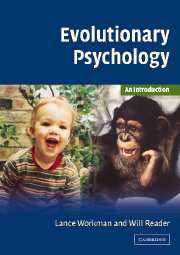Book contents
- Frontmatter
- Contents
- List of figures
- List of tables
- 1 Introduction to evolutionary psychology
- 2 Mechanisms of evolutionary change
- 3 Sexual selection
- 4 The evolution of human mate choice
- 5 Cognitive development and the innateness issue
- 6 Social development
- 7 The evolutionary psychology of social behaviour – kin relationships and conflict
- 8 The evolutionary psychology of social behaviour – reciprocity and group behaviour
- 9 Evolution, thought and cognition
- 10 The evolution of language
- 11 The evolution of emotion
- 12 Evolutionary psychopathology and Darwinian medicine
- 13 Evolutionary psychology and culture
- Glossary
- References
- Index
- References
10 - The evolution of language
- Frontmatter
- Contents
- List of figures
- List of tables
- 1 Introduction to evolutionary psychology
- 2 Mechanisms of evolutionary change
- 3 Sexual selection
- 4 The evolution of human mate choice
- 5 Cognitive development and the innateness issue
- 6 Social development
- 7 The evolutionary psychology of social behaviour – kin relationships and conflict
- 8 The evolutionary psychology of social behaviour – reciprocity and group behaviour
- 9 Evolution, thought and cognition
- 10 The evolution of language
- 11 The evolution of emotion
- 12 Evolutionary psychopathology and Darwinian medicine
- 13 Evolutionary psychology and culture
- Glossary
- References
- Index
- References
Summary
Key concepts learnability argument, ostensive communication, Universal Grammar (UG), parameter setting, whole object assumption, taxonomic assumption, mutual exclusivity assumption, inflectional morphology, derivational morphology, social grooming hypothesis, social contract hypothesis, specific language impairment
Without language, social interaction would be impoverished beyond recognition. It enables us to reveal our innermost thoughts to others, or, if the mood takes us, to disguise them with misinformation and lies. With language, action can be coordinated so that a group of people can act as one – even if chimpanzees could conceive of a pyramid they still couldn't build one because they lack the ability to coordinate action through language. Language also, as we shall see in chapter 13, enables hard-won knowledge to be passed on to others – including our children – enabling culture to proliferate in ways that would not have been possible in our languageless ancestors. When language evolved it was evolutionary dynamite. Not only did it vastly extend the range of things that ancestral humans were capable of, enabling them, perhaps, to outcompete other hominids around at the time, but it is also likely to have had an impact on the evolution of the brain itself. It is unlikely that our languageless ancestors had brains identical to ours but lacking the appropriate language circuitry; it is more likely that the gradual increase in communicative sophistication led to huge leaps in the way that the mind worked. So great are the advantages of language to our species that surely it must have been the product of natural (or sexual) selection. […]
- Type
- Chapter
- Information
- Evolutionary PsychologyAn Introduction, pp. 248 - 278Publisher: Cambridge University PressPrint publication year: 2004



